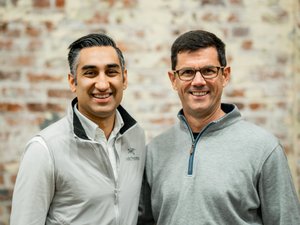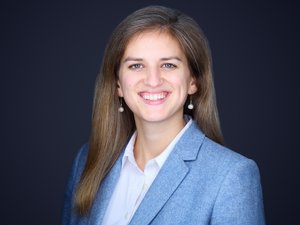
What did you miss at PitchBreakfast last week?
A Navy officer growing a peer to peer rental platform that helps customers find anything to rent from local businesses and neighbors. An attorney working on a blockchain game reward engine that seamlessly increases player engagement and expands the game from the digital world to the physical world. A computer scientist creating a platform for providers to have better view and control of their data in health care. An MBA who offers a service to safely and quickly connect people in emergency or evacuation situations with willing hosts able to offer temporary immediate shelter.
This month we featured four companies in the regular Pitch Breakfast format. During the event, each company had five minutes (with slides) to pitch followed by ten minutes of feedback from our panelists.
The panelist included:
- Daniel Friel, Innovator/Board Advisor/Founder
- Mark Bruinooge, Managing Director, ClearPath Foundation
- Garth Moulton, Co-founder of Jigsaw
Here were the main takeaways from last week:
In 5 minutes, the goal is about getting the next meeting
Co-founder and President John Alexander is an active U.S. Navy officer and graduate of the Virginia Military Institute. His co-founder, William Jackson, also served in the Navy and together they won the 2018 Charlotte Startup Veteran showcase hosted by Task Force X Capital.
With their company, Xchange Post, they wish to make renting a convenient alternative to purchasing expensive tools. It’s a peer to peer rental platform that allows users to find anything to rent from local businesses and neighbors, such as tools and equipment.
Equipment sitting around unused is what encouraged Alexander to create a solution to build value from these wasted resources.
“The truth is that we as Americans waste billions of dollars each year purchasing tools and equipment that we only use once or twice. The fact is the average tools in your garage spends 90 percent of the time sitting on your shelf,” Alexander explained.
The company invested in initial inventory to jumpstart the market and has begun partnering with companies to avoid the chicken and egg problem of community-based businesses. In the future, they wish to have 75 percent of the inventory come from the users, while they provide 25 percent of the available resources.
Friel explained how that pitch might hinder investors. “You are going to scare of the hell out potential investors when you start talking about buying your own inventory. That’s going to freak them out because that’s going to be their money tied up in inventory. They would rather much have a marketplace model than a traditional rental model,” he said.
Xchange Post charges a fee for each transaction completed in the rental platform. Soon the company plans to offer insurance packages to add revenue and protect inventory.
Regarding pitching, it’s all about focus.
“You made great use of your time,” Moulton explained. “One of my pet peeves is people who stand up and try to give a 30-minute pitch in five minutes. Stream over everything and don’t touch anything. I want to know who you are, what your basic idea is and go straight into the business.”
Pick a shot and take your shot and work on it
In the past, Frank Bilotto raised angel and VC funding for technology/content startups, which led to three successful exits to date. Today, Bilotto is a part of a team scaling Monetizer, a non-disruptive, seamless technology that engages gamers by paying them for their time and skill in MTZ tokens. Gamers use MTZs to buy physical goods, services or exchange them for other cryptocurrencies.
“Essentially, 25+ game studios, 17 million gamers, and three patents pending and delivering merchandise to 45 countries,” Bilotto said.
Monetizer, as the name suggests, allows developers to monetize its products by in-game product sales and is now prototyping token mining by using the untapped power of devices. The company wishes to give game studios and developers the ability to use the excess capacity on the gamers device to mine cryptocurrencies like bitcoin. This creates a new revenue stream for game studios and independent game developers.
“In a short test, with 10 million gamers we raised 4 million worth of bitcoin. It’s a test, not real, but it proves the concept,” Bilotto explained.
The company is an alumnus of Techstars '17 Global business accelerator, and based on its website the company appears to have a clear roadmap. Even with a roadmap, a five to ten-minute pitch can be difficult to deliver.
“You might want to build two pitches and literally A-B test in low risk stuff and see what resonates more,” Bruinooge advised Bilotto.
Bruinooge added, “It’s like two different pitches, in the five to 10-minute format—again, pick one. Get the meeting and get credible conversation going.”
“I would focus on one or the other but not both at least initially. You can get there down the road, but I think it has to be a natural flow,” Friel noted. “From the very beginning, you need to tie in how you fit in. I would get to the team earlier. Twenty-five real customers is real. I would probably focus more on that.”
Lead with a great hook then add one more layer of detail
Ojash Shrestha is a co-founder and software developer at Healthcare Provided Directory. The company is a one-stop-shop for current and comprehensive data on provider profiles, quality and procedure costs.
How to get people’s attention? Shrestha began by sharing how his insurance price increased massively when he started his own business.
“When I went self-employed, I had to buy my own health insurance. My chart here shows you my premium went from about $600 dollars and to $3,200 dollars for the same insurance and premium,” Shrestha explained.
The pitch started with a great hook, according to panelist feedback. “I like what you do when you started out. There is value when you say my insurance went from about $600 a month to $3200,” Friel said.
Healthcare Provided Directory wishes to empower providers and patients with information to make better health care decisions. Healthcare Provided Directory allows businesses to integrate with the nation’s largest database of healthcare providers, provider quality and procedure costs.
Panelists stressed to Shrestha that team is always important, and to consider spending more time highlighting them when appropriate—especially when entering an industry controlled by a few large firms.
“I know you tackling a very ambitious space. I’m not knocking your people, but you are going against some really powerful people,” Moulton said. “The ocean you are taking, your row boat will eat you alive—a little more about why you are the captain of the boat.”
Explain what you have learned and what you plan to learn with the funds
Adam Huminsky and Brian Hilinski wish to connect people in need with people who care through their startup. It all began in September of 2017, when Huminsky and Hilinski saw the evacuation of 5 million in Florida ahead of Hurricane Irma.
“We witnessed entire families sleeping in parking lots and rest areas because hotels were charging absurd rates. We saw all that and thought, there has to be a better solution than expecting people to sleep in rest areas,” Humisky explained.
The idea was born when Huminsky was searching online for a safe and easy way to list his spare bedroom during Hurricane Irma. Harmany is a mobile app that allows people in safe locations to offer their place for a few days for free to anybody who is going through an emergency or evacuation event.
Hilinski explained that the company had the mother of all tests when Hurricane Florence hit the Carolinas.
“We were looking for proof of concept and wanted to make sure the app worked during stress. In a 36-hour period of time, we had over 500 people sign up to host people who were coming inland. It was a massive success from a testing standpoint,” Hilinski noted.
That breakdown resonated with Bruinooge. “You are the first person in several years that actually said, here is what we want to learn from a prototype and we did,” he said. “We are going to learn from our mistakes quickly, use capital efficiency and get to a point when we can scale. That’s what seed and series A investors care about.”
Friel and Moulton advised Hilinski to provide more information about the use of funds for the $800,00 the company is seeking.
“When you did 800k in seed, you talked about two years you were going to scale up. But I also want what milestones you have. We are going to go and do this in the Carolinas. I can get a use of funds and I can know what my targets are going to be,” Friel said.
Moulton offered this feedback: “More details and time about what you are going to do specifically with the money. And maybe one more layer of detail about the business model.”
For more stories like this, subscribe to StartCharlotte’s free weekly startup newsletter.








